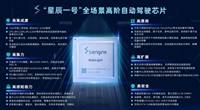| 型号 | 品牌 | 获取价格 | 描述 | 数据表 |
| NTMFS6H818NLT1G | ONSEMI |
获取价格 |
MOSFET - Power, Single, N-Channel, 80 V, 3.2m |

|
| NTMFS6H818NT1G | ONSEMI |
获取价格 |
单 N 沟道,功率 MOSFET,80V,123A,3.7mΩ |

|
| NTMFS6H824NLT1G | ONSEMI |
获取价格 |
Power MOSFET 80V, 110A, 4.0 mOhm, Single N-Channel, SO8-FL. |

|
| NTMFS6H824NT1G | ONSEMI |
获取价格 |
Power MOSFET, Single N-Channel, 80V, 103A, 4. |

|
| NTMFS6H836NLT1G | ONSEMI |
获取价格 |
Power MOSFET, Single N-Channel, 80V, 77A, 6.2 mOhm |

|
| NTMFS6H848NLT1G | ONSEMI |
获取价格 |
Power MOSFET, Single N-Channel, 80V, 59A, 8.8 mOhm |

|
| NTMFS6H852NLT1G | ONSEMI |
获取价格 |
Power MOSFET, Single N-Channel, 80V, 42A, 13. |

|
| NTMFS6H858NLT1G | ONSEMI |
获取价格 |
Power MOSFET 80V, 30A, 19.5 mOhm, Single N-Channel, SO8-FL. |

|
| NTMFS6H864NLT1G | ONSEMI |
获取价格 |
MOSFET - Power, Single, N-Channel, 80 V, 29mΩ |

|
| NTMFS7D5N15MC | ONSEMI |
获取价格 |
N-Channel Shielded Gate PowerTrench® MOSFET 1 |

|
 英伟达新AI芯片Rubin或提前半年亮相
英伟达新AI芯片Rubin或提前半年亮相

 苹果iPhone 17将全系采用三星/LG显示LTPO OLED面板
苹果iPhone 17将全系采用三星/LG显示LTPO OLED面板

 三星深化印度制造布局,供应链本地化进程加速
三星深化印度制造布局,供应链本地化进程加速

 芯擎科技“星辰一号”自动驾驶芯片点亮成功,2025年量产在即
芯擎科技“星辰一号”自动驾驶芯片点亮成功,2025年量产在即
